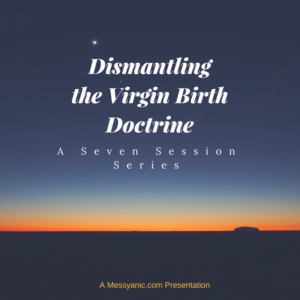 Genesis 1 Establishes a Natural Order
Genesis 1 Establishes a Natural Order
Generally speaking, all life is made to reproduce after like kind.
Given that the Virgin Birth Doctrine deviates from this Natural Order established by the Creator in the beginning, the burden of proof should fall on the proponents of that doctrine to defend their case, not on those who adhere to the Creator’s way.
But because this doctrine is so pervasive in our modern western culture, the notion of the Messiah being born by natural means is widely considered to be the deviant position.
As a result, those who challenge the Virgin Birth doctrine often find themselves in the weaker position of having to speak from a limited pool of Biblical text, because the case for a Virgin Birth can only be made in a few verses, namely within the first chapters of Matthew and Luke.
But the fact of the matter is that the Bible at large not only speaks to the Natural Order, and strongly against the usurping of it, but it also speaks of many promises made by the Creator toward mankind by way of various covenants, all reinforcing the Natural Order.
Multiple witnesses testify of these things, and an ample supply of evidence to support this order and the carrying out of these covenants on the part of the Creator are often overlooked in the Virgin Birth debate.
Consequently, a great divide is formed between the Old and New Testaments, and many are either rejecting Jesus as the Messiah or embracing a false image of him.
So, I have chosen to act as the Prosecutor in the case for the Natural Order and the expectation concerning the Messiah, utilizing the entire Biblical text to challenge this doctrine and ultimately dismantle it.
My hope in presenting this case…
To equip the average person with the Biblical evidence to not only address the Virgin Birth talking points, but also to demonstrate beyond a shadow of doubt that the Bible not only overwhelmingly upholds the Natural Order, but requires the anticipated Messiah to be born of natural human descent.
Considering the Source Text
The Old Testament reflected in most of today’s English translations of the Bible is translated from the Hebrew Masoretic Text, which was compiled many centuries after Jesus was born.
However, there is a Greek text known as the Septuagint, which is a Koine Greek translation of an earlier Hebrew text than the Masoretic.
The New Testament is mostly translated from Greek manuscripts, written in Koine Greek, and it appears that the Greek Septuagint is the text from which most of the writers of the NT quoted in their writings.
I will be quoting mostly from the Septuagint when quoting from the Old Testament and usually from either the Youngs’ Literal Translation or the King James Version when quoting from the New Testament throughout this series.
Also, I will be referring to Strong’s numbers that coincide with the Strong’s Concordance, as well as Thayer’s Greek Definitions and Brown-Driver-Briggs Hebrew Definitions for meanings of several key terms.
- Proceed to Session I: In the Beginning
If you have any questions, comments or concerns please share them below. I look forward to sharing with you what I’ve learned. 🙂

